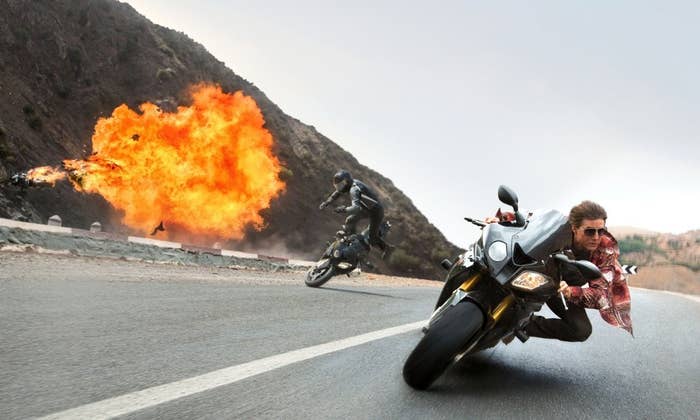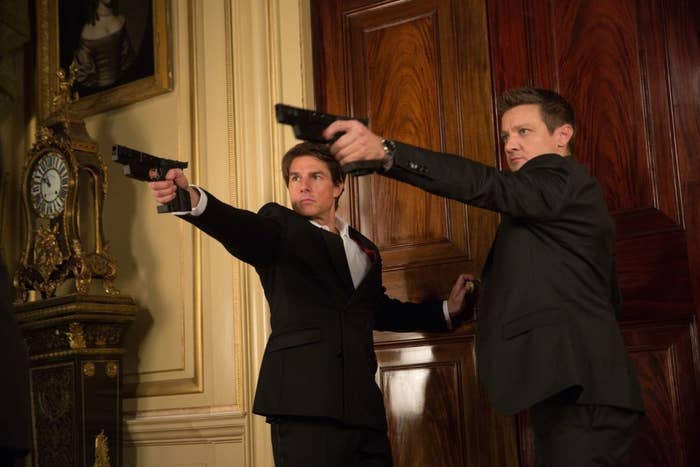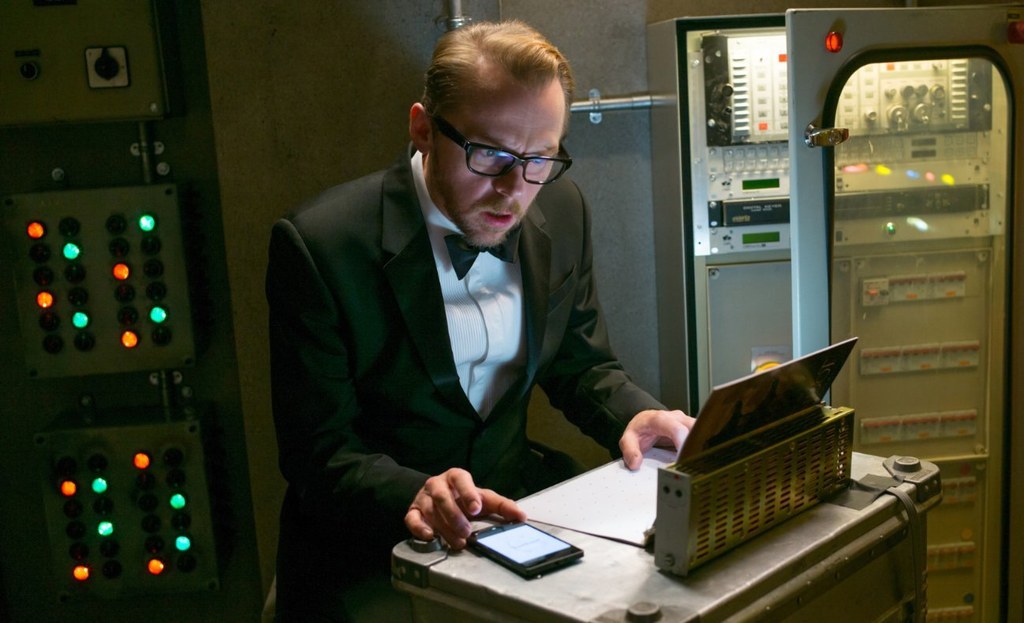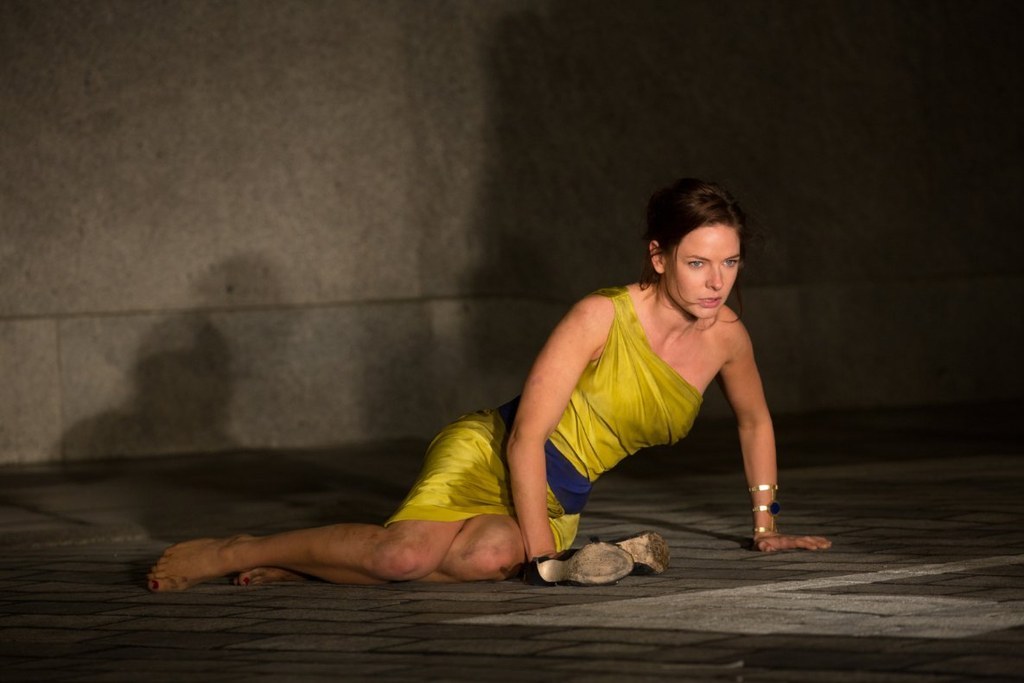It's old.

The Mission: Impossible movies have now been around for just under two decades, almost twice as long as the television show on which they're based (and that's counting the '80s revival). The first film came out in 1996, when Cruise was 33 and his co-star was the owl-eyed French actress Emmanuelle Béart, making a doomed bid for American stardom. It was directed by no less than Brian De Palma (of Scarface and Carrie) and co-written by Chinatown's Oscar-winning Robert Towne, who also scripted the John Woo–helmed sequel. Film series have certainly chugged on for longer — see Alien, Star Wars, Planet of the Apes — but it's rare for one this long in the tooth to also be so continuous. Ethan Hunt, the indestructible IMF agent extraordinaire played by Cruise, has never passed the torch off to someone else, even as his team has shifted around him.
Five features in, the franchise could easily feel past its prime. But through the same blockbuster thaumaturgy that's allowed the Fast & Furious films to scale up into operatic, chrome-crunching weepies, Mission: Impossible has somehow adapted and gotten better over time. Mission: Impossible — Rogue Nation may not be the best in the series (a win I'd give to 2011's Ghost Protocol), but it easily tops that first movie, which, despite its pedigree and box office success, was a mixed bag. The franchise has gradually refined its combination of jaw-dropping action set pieces and sleekly cool world of espionage into something that's approaching pop perfection. And in a moment in which studio movies have fallen hard for serialization — even the latest string of Bond films are linked — Mission: Impossible's weightlessness, both in its stunts and in its spirit, is its greatest asset.
It stars Tom Cruise.

And Cruise's career has gone through some roller coaster swings over the course of the franchise. Cruise was still married to Nicole Kidman when he made the first Mission: Impossible — in the time since, he's married and divorced Katie Holmes, jumped on Oprah's couch, gotten dumped by Paramount, starred in a feverish Scientology promotional video that was leaked to the public, and reinvented his career as a Real Action Star, the guy who does his own stunts. His public image has taken a battering and may always be fraught, but onscreen, he's clung to movie stardom and youth with astonishing willpower.
And it works. Ethan Hunt is the kind of role that's a perfect fit for Cruise's overwhelming gameness, his willingness both to dangle off the world's tallest building and to spend weeks doing cheery TV promotional appearances around the globe. Ethan's aura of inhumanity in Rogue Nation syncs nicely with Cruise's to create a character aware of his own larger-than-life status. "I've heard stories," gasps an IMF worker upon meeting him. "They can't all be true!" Cruise pauses, then smiles, like he's running through the ones he's heard himself and verifying that, yes, they all totally happened.
Over the course of Rogue Nation, Cruise, now 53, vaults shirtless up a pole in handcuffs like some big-screen Pilates advertisement; he jumps off an opera house roof; he clings to a plane that takes off, a much-touted stunt that's actually just the movie's equivalent of a cold open; and, most impressively, he makes fun of his own imperviousness in the flash of alarm that flickers across his face as Benji Dunn (Simon Pegg) volunteers him for an insane break-in (and in the bit of physical comedy that comes when his character's still recovering afterward).
The plot makes little to no sense.

The big bad in Mission: Impossible — Rogue Nation is the Syndicate, a kind of evil answer to the IMF run by Solomon Lane (Sean Harris). It's extra vague and ultimately meaningless what a shadow version of the organization would entail, given that it's never all that clear what the IMF does, other than operate without oversight. Like the previous films in the franchise, Rogue Nation is all multi-continent MacGuffin-chasing, and the convoluted plot is only a way to ferry the characters between action sequences. The first Mission: Impossible went into preproduction without a finalized script, and over the years, that idea has become more of a feature than a bug — in the midst of shooting, Rogue Nation shut down for a week so that a new ending could be sorted out.
The movie, which was directed by Christopher McQuarrie of Jack Reacher, feels like it was conceived of set piece–first, even more than previous installments. That's rarely a quality to recommend, but in Rogue Nation, it helps create an air of blithe freedom. Who cares what's going on here? Spies! Assassination attempts at the opera! Motorcycle chases through Morocco! Some underwater heist thing! It's an insular, gloriously garbled universe of hyper-competent agents running around while the rest of humanity seems unaware — a fact the film winks at during a Senate hearing in which the IMF's past misdeeds, involving the trashing of at least one international landmark, are listed by an irate CIA Director Alan Hunley (Alec Baldwin).
There's a revolving door of female characters.

Ethan Hunt is, obviously, the center of any Mission: Impossible movie — Cruise isn't just the star of the series, he's the producer. Ving Rhames's computer expert Luther Stickell has been in all five installments as well, having started as a disavowed agent Ethan recruits when on the run. Simon Pegg's technician (and comic relief source) Benji Dunn was added to the franchise in Mission: Impossible III, while Jeremy Renner's field agent turned suit William Brandt joined in Ghost Protocol. But the women come and go, and there's rarely room for more than one or two of them. Maggie Q in the third film is replaced by Paula Patton in the fourth. The second film's love interest, Thandie Newton, is swapped out in Mission: Impossible III for Michelle Monaghan, who shows up briefly in Ghost Protocol before retreating into normal life, leaving Ethan (so far) chastely single.
There are plenty of other cast members who don't make repeat appearances, but it's particularly noticeable with the ladies, which is what makes the excellence of Rogue Nation's female lead, Rebecca Ferguson, bittersweet. As Ilsa Faust, an undercover agent trapped in a difficult position, Ferguson's character is set up as an answer to Cruise's. Ilsa can fight, shoot, bluff, and look excellent in a dress, and she saves Ethan as often as he returns the favor, all with a throwback movie star glamour and a sense of troubled vulnerability. She's a worthy summer movie bookend to Furiosa in Mad Max: Fury Road, and the only downside to her character is that, given the franchise's history, she seems unlikely to return.
